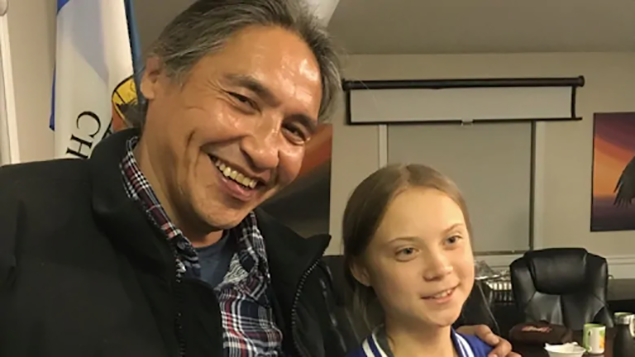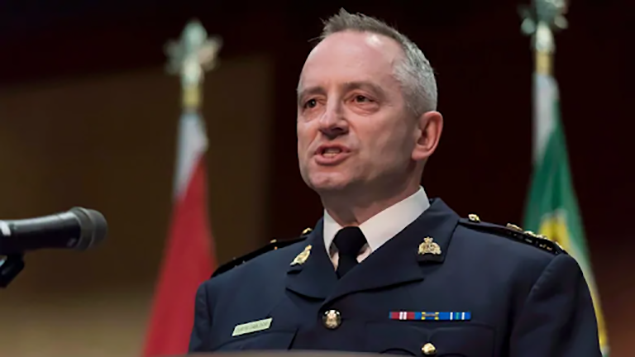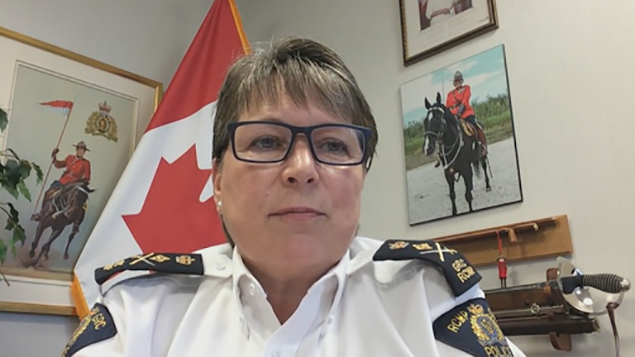As the RCMP continues to come under increased scrutiny–and criticism–Commissioner Brenda Lucki says the force needs to do more to confront “unconscious bias,” as well as members who “don’t act in accordance with our core values, which includes racism, and it’s those times that we have to make sure that that doesn’t happen.”
Lucki made the comments Wednesday in an interview with CBC News when asked about the allegation by Chief Allan Adam of the Athabasca Chipewyan First Nation in Alberta that he was beaten by RCMP officers and his wife was manhandled back in March after police stopped him for an expired licence plate in Fort McMurray, Alberta.
At a press conference last weekend, Chief Adam provided pictures that have shocked Canadians across the country, including Prime Minister Justin Trudeau.
“Nobody likes to see pictures like that,” Lucki told the CBC’s Rosemary Barton.

Athabasca Chipewyan First Nation Chief Allan Adam spoke to reporters about an alleged assault by Wood Buffalo RCMP officers earlier this year in Fort McMurray, Alberta. (Jamie Malbeuf/CBC)
“There’s always a set of circumstances and, depending on the circumstances and the level of resistance, sometimes there are intervention actions that need to be taken.
“Obviously, we never want to see anybody get hurt when we’re dealing with anybody in any incident, but it does happen.”
The Alberta Serious Incident Response Team, an independent body which investigates deaths or injuries involving police, is investigating the incident.

In happier times, Chief Adam met with climate activist Greta Thunberg in Fort McMurray last October. (submitted)
When asked about comments earlier this week by the RCMP’s top officer in Alberta, Deputy Commissioner Curtis Zablocki, who said he did not believe racism was systemic through Canadian policing, Lucki told Barton that she has since spoken with Zablocki and that he had misinterpreted the term “systemic racism.”
“His intention was to simply say that, you know, if there is racism, he didn’t believe it in his thoughts that it was rampant across the organization,” she said.

RCMP Deputy Commissioner Curtis Zablocki’s comments came a day after Alberta’s Serious Incident Response Team announced it would investigate claims of racism and police brutality brought forward by Athabasca Chipewyan Chief Adam. (THE CANADIAN PRESS/MichaelBell)
When asked if there is systemic racism in policing in Canada, Lucki said she believes there is “unconscious bias.”
“That is an interesting question because in the last couple of days I have honestly heard about 15 or 20 definitions of systemic racism,” she said.
“If it refers to an unconscious bias that exists … we definitely have that in the RCMP and we are not immune to it at all. There are times when our members don’t act in accordance with our core values, which includes racism, and it’s those times that we have to make sure that that doesn’t happen.”
Lucki also said the force will review its use of the so-called “carotid control hold,” the act of compressing the arteries on either side of a person’s neck, a restraint that can lead to serious injury or death if it is not applied correctly.

RCMP Commissioner Brenda Lucki says the force needs to do more to confront ‘unconscious bias.’ (CBC News)
Police forces around the world are now banning the restraint, also known as the “sleeper hold” or “blood choke,” following the death of George Floyd on Minnesota on May 25–though the Minneapolis police officer who has been charged with Floyd’s murder did not use it.
“We’ll definitely review it,” Lucki told Barton.
Lucki said the carotid control hold is at the far end of the continuum of police use of force, on par with using a firearm.
“It’s when something serious or death or bodily harm is going to happen,” she said.
“Any time there is any review of any kind of intervention or any police technique, we’re always looking at what happened with that review and how it can be applied to the RCMP context.”

RCMP work at a roadblock outside Onanole, Manitoba after an officer was shot in August 2018. (Riley Laychuk/CBC)
As a bottleneck at the RCMP continues to delay the release of civilian oversight investigations of complaints about the force’s behaviour, Lucki also had interviews Wednesday with Canada’s two other national networks.
It was the second time this week she’s made news.
On Monday, she announced that some officers would begin wearing body cameras.
The announcement followed anti-racism and anti-police brutality demonstrations across the country last weekend, as well as other recent events that have to make the RCMP and Lucki uncomfortable.
Besides the allegations by Chief Adam, they include:
- A CBC News report that the Legal Services Board of Nunavut had described more than 30 allegations of misconduct, abuse and inhumane treatment of Inuit, especially women, at the hands of Nunavut RCMP–prompting local leaders to call for a systemic review of how the RCMP is handling its duties in the territory.
- The premier of the Northwest Territories calling the issue of racism “huge,” in an interview with CBC News.
- The violent arrest of an Inuk man in Nunavut–captured on video–that again raised questions about policing in Canada’s North.
- Criminal charges being filed against a total of five RCMP officers in Alberta and in British Columbia for alleged criminal offences dating back to 2017.
- Residents of Yukon and the Northwest Territories demonstrating against racism and police brutality.
- Criticism about how the RCMP responded to a shooting rampage date in Nova Scotia in which 23 people, including the alleged killer, died.
Lucki said she “absolutely” welcomes an external review of the shooting rampage.
“We don’t get it perfect every time,” Lucki told Barton.

The flags of Nova Scotia and Canada fly at half-mast outside the RCMP headquarters in Dartmouth, N.S., on April 19, after the mass shooting that left a total of 23 people dead at several locations in the province (Tim Krochak/AFP via Getty Images)
“We absolutely try to get it perfect every time but when it doesn’t, we need to figure out why it hasn’t gone perfect and that’s what a good review will do.”
With files from CBC News (Rosemary Barton, Catharine Tunney), RCI







For reasons beyond our control, and for an undetermined period of time, our comment section is now closed. However, our social networks remain open to your contributions.